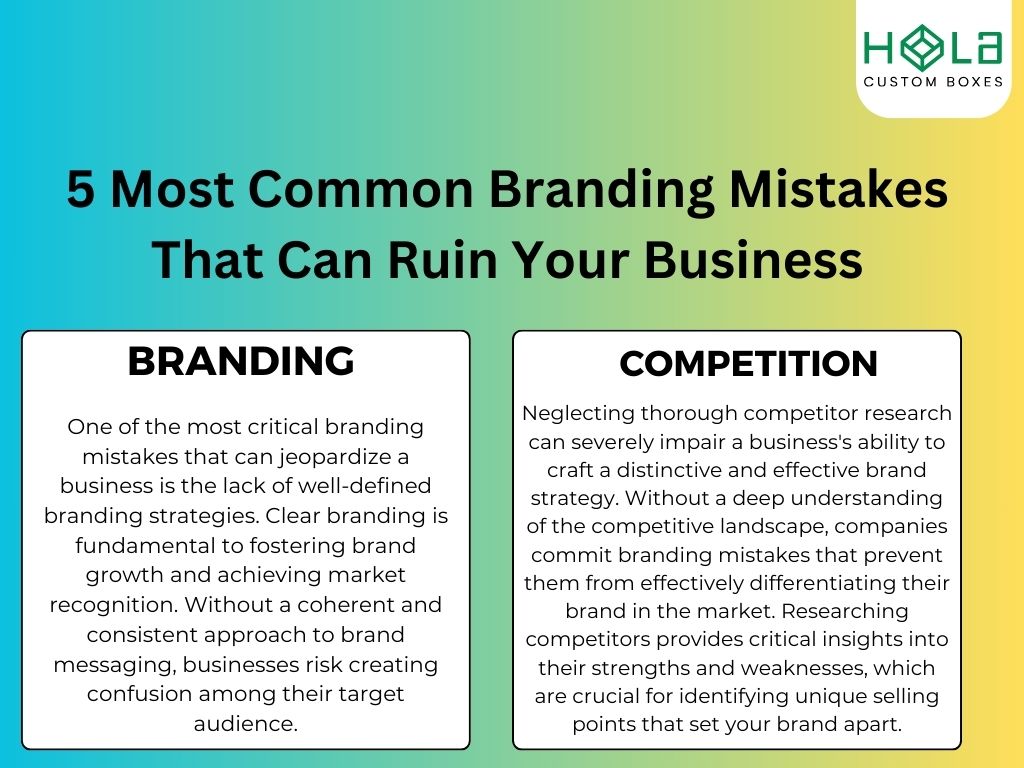5 Most Common Branding Mistakes That Can Ruin Your Business
2025-08-11 08:00:59
In the competitive landscape of today's market, businesses cannot afford to overlook the vital importance of effective branding. Often, companies make detrimental errors such as failing to establish clear branding strategies, neglecting competitor research, or misunderstanding their target audience. These missteps not only hinder growth but can also erode customer loyalty and market share.
Overlooking customer experience and lacking brand differentiation further exacerbate these challenges. As we explore these common branding pitfalls, it becomes evident how essential a well-rounded and strategic approach is for sustainable success. So, what are these mistakes, and how can they be avoided?
Main Points
• Undefined branding strategies create confusion and hinder market recognition.
• Neglecting competitor research results in missed opportunities and ineffective brand strategies.
• Ignoring customer experience diminishes brand loyalty and impacts reputation.
• Misunderstanding the target audience leads to ineffective marketing and lost customers.
• Lack of brand differentiation reduces market share and recognition.
Undefined Branding Strategies

One of the most critical branding mistakes that can jeopardize a business is the lack of well-defined branding strategies. Clear branding is fundamental to fostering brand growth and achieving market recognition. Without a coherent and consistent approach to brand messaging, businesses risk creating confusion among their target audience. This confusion can stymie brand recognition and erode consumer trust.
Effective branding strategies encompass a complete follow-up plan that guarantees clarity and consistency in every aspect of brand communication. Custom packaging plays a pivotal role in this regard. It must resonate with the preferences and interests of the target audience, enhancing the overall branding experience. Distinctive product packaging not only catches the eye but also reinforces brand messaging and aids in building loyalty and recognition.
Undefined branding strategies often lead to inconsistency, which undermines a company's competitive edge. A well-executed, clear branding strategy enables businesses to stand out in a crowded market and connect meaningfully with their audience. In contrast, the absence of such strategic planning can result in lost opportunities and diminished brand presence.
Investing in well-defined branding strategies is essential for long-term success and sustainable brand growth.
Failing to Research Competition
Neglecting thorough competitor research can severely impair a business's ability to craft a distinctive and effective brand strategy. Without a deep understanding of the competitive landscape, companies commit branding mistakes that prevent them from effectively differentiating their brand in the market. Researching competitors provides critical insights into their strengths and weaknesses, which are crucial for identifying unique selling points that set your brand apart.
Failing to conduct in-depth competitor research can result in missed opportunities for growth and innovation. By understanding what competitors are doing right and where they fall short, businesses can capitalize on areas that are underserved or innovate in ways that competitors have not yet explored. This strategic advantage is lost when companies overlook the importance of competitor analysis.
Inaccurately judging the competition can lead to ineffective branding strategies that fail to resonate with the target audience. Replicating competitors without a clear understanding of their strategies and positioning can damage your brand's reputation and dilute its identity.
A well-researched approach, conversely, ensures that your brand is not only competitive but also uniquely positioned to thrive in a crowded marketplace. Therefore, diligent competitor research is indispensable for avoiding branding pitfalls and fostering sustainable business growth.
Neglecting Customer Experience
Overlooking customer experience can severely damage a brand’s ability to retain loyal customers and achieve long-term success. In today’s competitive market, customer experience is not just a nice-to-have—it’s a decisive factor that shapes brand loyalty and influences buying decisions.
When satisfaction is neglected, negative online reviews often follow, tarnishing a brand’s reputation and discouraging potential customers. Poor feedback spreads quickly, reshaping public perception and creating lasting damage.
Proactively seeking and valuing customer feedback is essential for identifying pain points and aligning offerings with customer expectations. Brands that consistently deliver exceptional experiences are far more likely to foster loyalty, drive repeat business, and stand out in crowded markets.
Conversely, ignoring customer needs can create a widening gap between what a brand offers and what customers want—leading to lost opportunities, reduced competitiveness, and long-term brand erosion.
In short, prioritizing customer experience isn’t optional—it’s a business imperative that safeguards your reputation, builds lasting relationships, and fuels sustainable growth.
Misunderstanding Target Audience
Understanding and meeting customer expectations is essential, but equally important is correctly identifying and comprehending your target audience. Failing to understand the target audience can lead to losing customers and missing valuable business opportunities.
Effective branding hinges on thorough research into audience demographics, preferences, and behaviors. Brands that align with their target audience's values and interests are inherently more likely to succeed.
Misunderstanding your target audience can result in wasted marketing efforts and resources. Without a clear understanding of who your customers are, it becomes challenging to create tailored messaging that resonates with them. This disconnect can lead to marketing campaigns that fall flat, products that don't meet specific needs, and services that fail to match customer expectations.
Lack of Brand Differentiation
Establishing a unique brand identity is essential for distinguishing your business from competitors and capturing the attention of potential customers. Brand differentiation is the cornerstone of effective branding strategies, enabling your brand to stand out in a crowded market. Without it, your business risks blending in with competitors, leading to decreased brand recognition and potential loss of market share.
Incorporating unique branding elements is vital for creating a memorable and distinctive brand. These elements not only help attract target audiences but also communicate what makes your brand valuable to consumers. When a business fails to highlight its unique selling points, it suffers from a lack of differentiation. This can ultimately ruin your business by making it difficult for customers to choose your products or services over those of your competitors.
Effective branding strategies should focus on understanding and emphasizing the aspects that set your brand apart. Whether it's through innovative product features, exceptional customer service, or a compelling brand story, clear differentiation is key. By neglecting this critical aspect, you risk your brand becoming a mere commodity in the eyes of consumers, thereby undermining your business's growth and long-t
